Daily Current Affairs and GK | 3 June 2021

Main Headlines:
- 1. Former Supreme Court judge Justice Arun Mishra appointed as Chairperson of NHRC.
- 2. B.1.617.1 and B.1.617.2 variants of Covid-19 named as ‘Kappa' and 'Delta' respectively.
- 3. Cabinet approves draft of Model Tenancy Act.
- 4. Isaac Herzog elected as new President of Israel.
- 5. MoU between India and Maldives on cooperation in the field of sustainable urban development approved by Union Cabinet.
- 6. World Bicycle Day: 3 June
- 7. NITI Aayog launched 3rd edition of SDG India Index.
- 8. Union Cabinet approves memorandum of cooperation between India-Japan on urban development
- 9. CSIR-NCL lab developed a new technique for disinfecting water by using natural oils.
- 10. China developed a combined air defense system along LAC.
- 11. Climate Breakthroughs Summit concluded on 27 May.
Happy February get 35% Off
Use Coupon code FEB26
Topic: Appointment
1. Former Supreme Court judge Justice Arun Mishra appointed as Chairperson of NHRC.
- Former Supreme Court judge Justice Arun Mishra has been appointed as Chairperson of the National Human Rights Commission (NHRC).
- He took office as Chairperson of NHRC on 02 June. He had retired from SC on September 3 last year.
- His tenure as chairperson of NHRC will be for three years or till he attains the age of 70, whichever is earlier.
- The post of NHRC chairperson has been vacant for almost 6 months since former Chief Justice of India H L Dattu retired in December last year.
- Former SC Judge Prafulla Pant was appointed the acting chairperson of NHRC.
- National Human Rights Commission (NHRC):
- It is a statutory body that was established under the Protection of Human Rights Act, 1993.
- It consists of a chairperson and five members. The chairperson should be retired chief justice of India or a judge of the Supreme Court.
- President appoints the chairperson and members of NHRC on the recommendations of a six-member committee.
- The chairperson and members hold office for a term of three years or until they attain the age of 70 years.
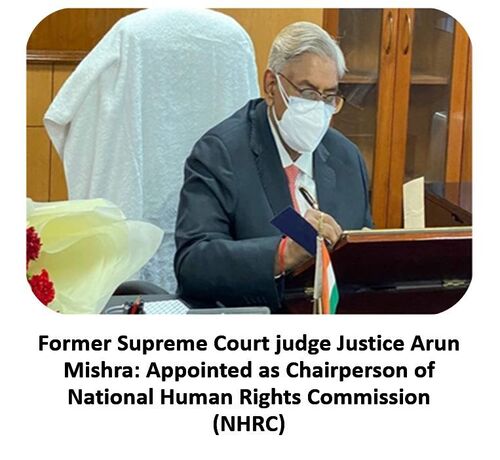
Topic: Biotechnology and Disease
2. B.1.617.1 and B.1.617.2 variants of Covid-19 named as ‘Kappa' and 'Delta' respectively.
- B.1.617.1 and B.1.617.2 variants of Covid-19 named ‘Kappa' and 'Delta' respectively.
- Both variants were first identified in India. India has earlier objected to a media report calling B.1.617 mutant of the novel coronavirus an "Indian Variant".
- Health Ministry said that WHO has not used the word “Indian” for this strain in the document.
- On May 12, the Ministry termed media reports using the term “Indian variant” for B.1.617 mutant strain as unfounded.
- As per WHO, B.1.617 mutant strain is a variant of global concern.
- Till now, WHO has identified four Variants of Concern (VOC). They are B.1.1.7, B.1.351, P2 and B.1.617.2.
- First four letters of the Greek alphabet (Alpha, Beta, Gamma and Delta) will be used as public labels for these VOC.
- So, the variant first identified in India (B.1.617.2) can be described as 'Delta' and 'UK variant' can be described as 'Alpha'.
- B.1.617.1 is sub lineage of B.1.617 family. It was also identified in India and now bears popular label ‘Kappa’.
Topic: Government Schemes and Initiatives
3. Cabinet approves draft of Model Tenancy Act.
- The draft of the Model Tenancy Act (MTA) has been approved by the Union Cabinet, chaired by Prime Minister Narendra Modi on 2 June.
- The draft of the Model Tenancy Act (MTA) creates a balance between the interest of owners and tenants. It will help in revamping the legal framework related to rental housing across the country.
- It will develop a vibrant, sustainable, and inclusive rental housing market in the country. Through this draft, private participation in developing the tenancy market as a business will increase.
- It will cover urban and rural areas and also create a time-bound grievance redressal mechanism.

Topic: International News
4. Isaac Herzog elected as new President of Israel.
- Veteran politician Isaac Herzog has been elected as 11th President of Israel. He is the son of a former President.
- He secured 87 votes in the 120-member house. He defeated his rival Miriam Peretz.
- He will replace current President Reuven Rivlin next month. He will begin his seven-year term from 9 July.
- Currently, he is the head of the Jewish Agency – a nonprofit organization. He also served as a minister with various portfolios.
- He started his political journey as the Cabinet Secretary of Prime Minister Ehud Barak between 1999 and 2000.
- Israel:
- It is a Middle Eastern country located on the Mediterranean Sea.
- Its capital is Jerusalem and the currency is the Israeli shekel.
- Benjamin Netanyahu is the Prime Minister of the country.
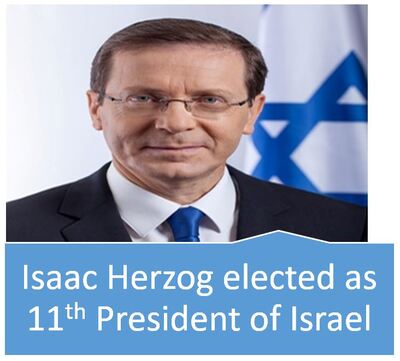
Topic: MoUs/Agreements
5. MoU between India and Maldives on cooperation in the field of sustainable urban development approved by Union Cabinet.
- The MoU was signed between the Ministry of Housing and Urban Affairs (MoHUA), Government of India and Ministry of National Planning, Housing and Infrastructure, Government of Maldives in February 2021.
- Now, a Joint Working Group (JWG) will be formed to implement programmes on cooperation under the framework of the Memorandum of Understanding (MoU).
- The JWG will meet once a year, alternately in Maldives and India.
- The MoU became effective on the date of its signing i.e. 20th February 2021. It will remain in force for an indefinite period.
- The aim of MoU is to promote and strengthen India-Maldives technical cooperation in the field of sustainable urban development.
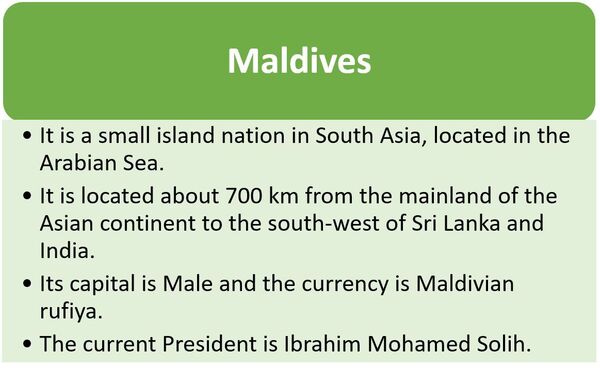
Topic: Important Days
6. World Bicycle Day: 3 June
- World Bicycle Day is observed every year on 3 June.
- In April 2018, UN General Assembly declared 3 June as World Bicycle Day.
- Bicycle is an environmentally sustainable means of transport.
- In October 2021, UN Sustainable Transport Conference will take place in Beijing, China. It will be focused on the role sustainable transport plays in achieving Sustainable Development Goals.
Topic: Reports and Indices
7. NITI Aayog launched 3rd edition of SDG India Index.
- Government think tank Niti Aayog launched the third edition of the Sustainable Development Goals (SDG) India Index.
- In 2018, this index was launched to measure the progress made by States and Union Territories towards achieving the Sustainable Development Goals.
- Now, it is used as a primary tool for monitoring progress on the SDGs in the country.
- NITI Aayog Vice Chairperson Rajiv Kumar also launched the report titled, SDG India Index and Dashboard 2020–21: Partnerships in the Decade of Action.
- SDG India Index 2020–21:
- The SDG India Index 2020–21 has been developed by NITI Aayog in collaboration with the United Nations. It is based on 16 Goals and 115 indicators.
- Under SDG India Index States and Union Territories are classified as given below:
- Aspirant: 0–49
- Performer: 50–64
- Front-Runner: 65–99
- Achiever: 100
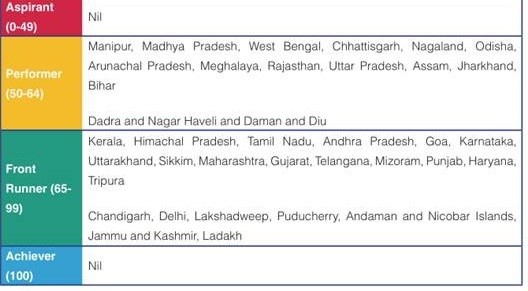
(Source: PIB)
- Finding of SDG India Index 2020–21:
- In 2020-21, the overall SDG score is 66. It has improved by 6 points from 2019.
- The score has improved in Goal 6 (Clean Water and Sanitation) and Goal 7(Affordable and Clean Energy).
- Kerala, Himachal Pradesh/Tamilnadu, Andhra Pradesh, Tamil Nadu, and Telangana are top five performer states.
- Bihar, Jharkhand, Assam, Uttar Pradesh, and Meghalaya are in the last five positions.
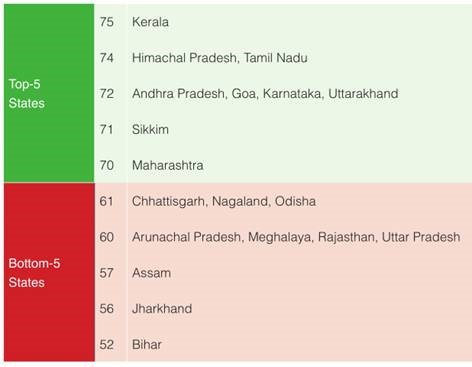
(Source: PIB)
Topic: MoUs/Agreements
8. Union Cabinet approves memorandum of cooperation between India-Japan on urban development
- The Union Cabinet has approved a memorandum of cooperation between India-Japan in the field of sustainable urban development.
- A Memorandum of Cooperation (MoC) on Sustainable Urban Development has been signed between the Ministry of Housing & Urban Affairs, Government of India and the Ministry of Land, Infrastructure, Transport and Tourism, Government of Japan.
- A Joint Working Group (JWG) will be also formed to implement the programmes on cooperation under the Memorandum of Cooperation (MoC). The JWG will meet once a year.
- The MoC will strengthen the technical cooperation in the field of Urban Planning, Smart Cities Development, Affordable Housing (including rental housing), Urban Flood Management, Sewerage and Waste Water Management, etc.
- The best practices and key learnings will be exchanged between India and Japan in the field of Sustainable Urban Development.
|
|
Japan: |
|
Topic: New Developments
9. CSIR-NCL lab developed a new technique for disinfecting water by using natural oils.
- The CSIR-National Chemical Laboratory (CSIR-NCL), Pune has developed a hybrid technology called "SWASTIK” for disinfecting water.
- CSIR-NCL has used natural oils having antimicrobial properties for disinfecting water.
- This is a cost-effective method for removing harmful bacteria from water. It is developed by using the traditional method of Ayurveda.
- It has used the hydrodynamic cavitation technique for removing impurities from water.
- It will help the government in providing clean drinking tap water supply to all rural households by 2024.
- National Chemical Laboratory:
- It is an Indian government laboratory located in Pune.
- It was established in 1950.
- It is responsible for research in polymer science, organic chemistry, material chemistry, etc.
Topic: India and its Neighbourhood
10. China developed a combined air defense system along LAC.
- China created a combined air defense system along the Line of Actual Control (LAC).
- The combined air defense system has been developed with the elements of the air force and army of western theatre command.
- For the first time, an integrated army air defence system has been developed by china along the western borders.
- The combined air defense system has been developed for putting all assets of the army and air force under central control.
- Since 2017, China has increased the number of airbases and heliports near the LAC.
- Line of Actual Control:
- It is a line that separates India controlled territory from Chinese-controlled territory.
- The major disagreement between India and China is on the western side of LAC.
- India-China LAC is divided into three parts:
- Arunachal and Sikkim Border
- Uttarakhand and Himachal Pradesh Border
- Ladakh Border
Topic: Summits/ Conferences/ Meetings
11. Climate Breakthroughs Summit concluded on 27 May.
- The Climate Breakthroughs Summit has concluded on 27 May.
- The Climate Breakthroughs Summit was organized by a collaboration of the World Economic Forum, Mission Possible Partnership, the United Nations Climate Champions, and the United Kingdom.
- The leaders discussed the progress in different sectors of the global economy, including steel, shipping, green hydrogen.
- The main objective of this summit is to move the world towards a zero-carbon economy.
- ‘Race to Zero’ is one of its key campaigns for a sustainable future. It encourages companies for cutting emission by 2030.
- Around 40 health care institutions have committed to reduce their emission by half by 2030 and these institutions will reach at net-zero level by 2050.





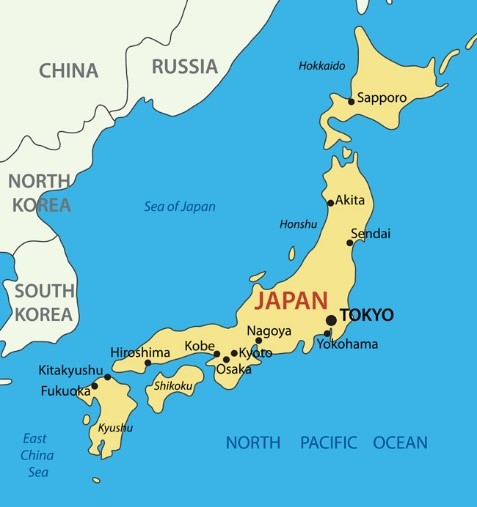
 2 June 2021 Current Affairs
2 June 2021 Current Affairs 








Comments